小学英语比较级课件
- 格式:ppt
- 大小:522.00 KB
- 文档页数:10
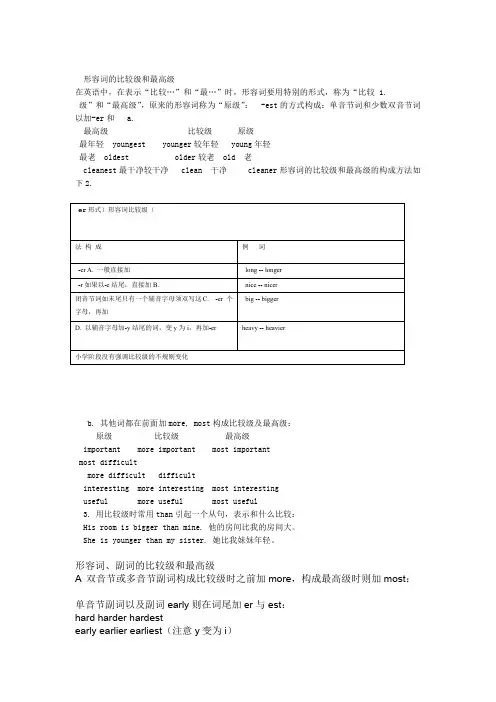
形容词的比较级和最高级在英语中,在表示“比较…”和“最…”时,形容词要用特别的形式,称为“比较 1.级”和“最高级”,原来的形容词称为“原级”: -est的方式构成:单音节词和少数双音节词以加-er和 a.最高级比较级原级最年轻 youngest younger较年轻 young年轻最老 oldest older较老 old 老cleanest最干净较干净 clean 干净 cleaner形容词的比较级和最高级的构成方法如下2.b. 其他词都在前面加more, most构成比较级及最高级:原级比较级最高级important more important most importantmost difficultmore difficult difficultinteresting more interesting most interestinguseful more useful most useful3. 用比较级时常用than引起一个从句,表示和什么比较:His room is bigger than mine. 他的房间比我的房间大。
She is younger than my sister. 她比我妹妹年轻。
形容词、副词的比较级和最高级A 双音节或多音节副词构成比较级时之前加more,构成最高级时则加most:单音节副词以及副词early则在词尾加er与est:hard harder hardestearly earlier earliest(注意y变为i)B 不规则变化:well better bestbadly worse worstlittle less leastmuch more mostfar farther farthest(仅用于指距离)further furthest.much,more,mostA more和most的用法相当自由:You should ride more.你必须多骑马。
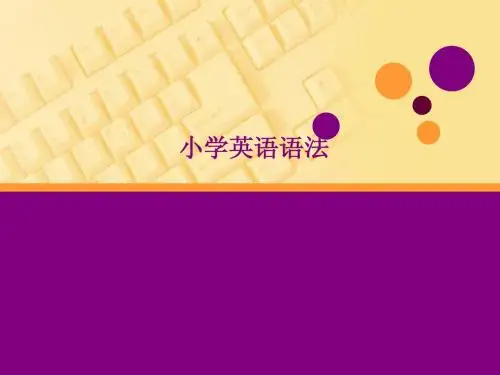
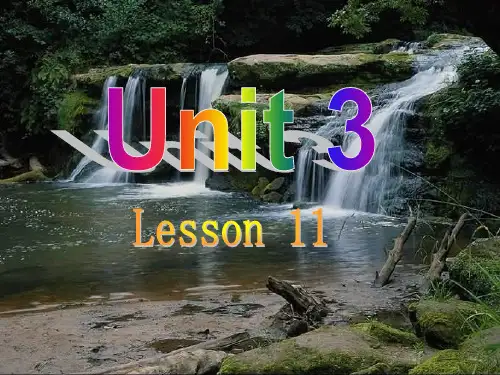
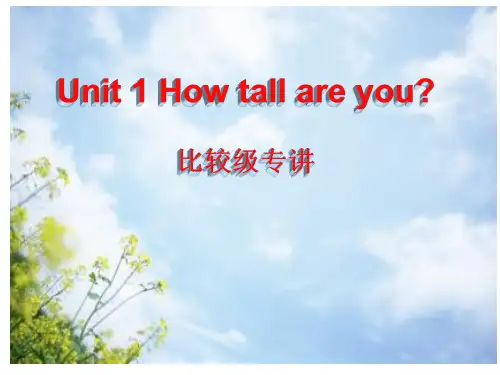
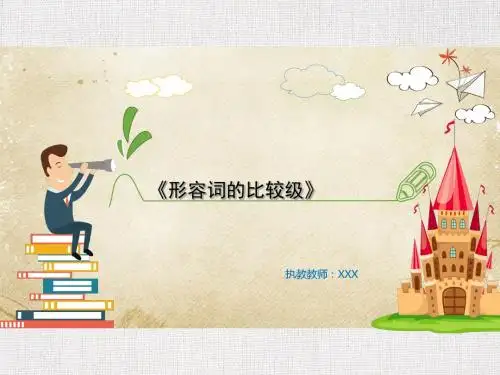
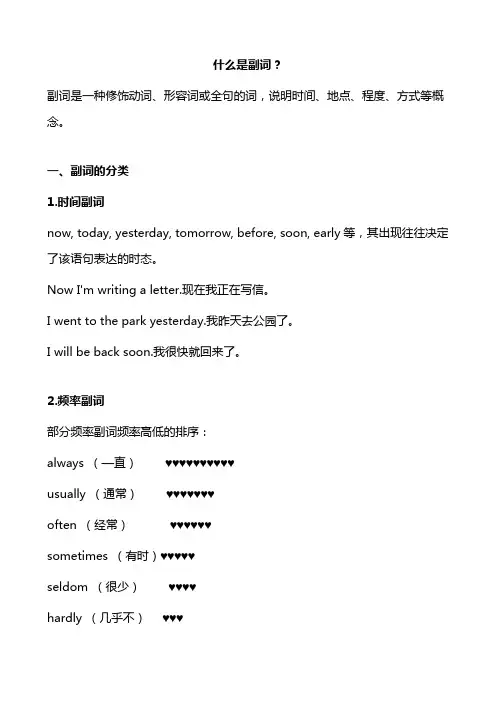
什么是副词?副词是一种修饰动词、形容词或全句的词,说明时间、地点、程度、方式等概念。
一、副词的分类1.时间副词now, today, yesterday, tomorrow, before, soon, early等,其出现往往决定了该语句表达的时态。
Now I'm writing a letter.现在我正在写信。
I went to the park yesterday.我昨天去公园了。
I will be back soon.我很快就回来了。
2.频率副词部分频率副词频率高低的排序:always (—直)♥♥♥♥♥♥♥♥♥♥usually (通常)♥♥♥♥♥♥♥often (经常)♥♥♥♥♥♥sometimes (有时)♥♥♥♥♥seldom (很少)♥♥♥♥hardly (几乎不)♥♥♥never (从不)还有说明次数的副词,once, twice等。
频率副词经常出现在一般现在时态的语句中,表示规律性的动作或习惯。
Ben often goes to the cinema with his friend.本经常和他的朋友岀去看电影。
He never eats hamburgers.他从不吃汉堡包。
3.地点副词here, everywhere, anywhere, in, out, inside, outside, above, below, down,back, forward, home, along, round, around, near, off, past, up, away 等地点副词一般表示事情发生的地点。
He played basketball here yesterday他昨天在这里打篮球。
It's raining outside.外面正在下雨。
The toilet is over there.厕所在那里。
4.方式副词carefully, properly, anxiously, suddenly, normally, fast,well, calmly, politely, proudly, softly, warmly等一般表示事情进行的方式。
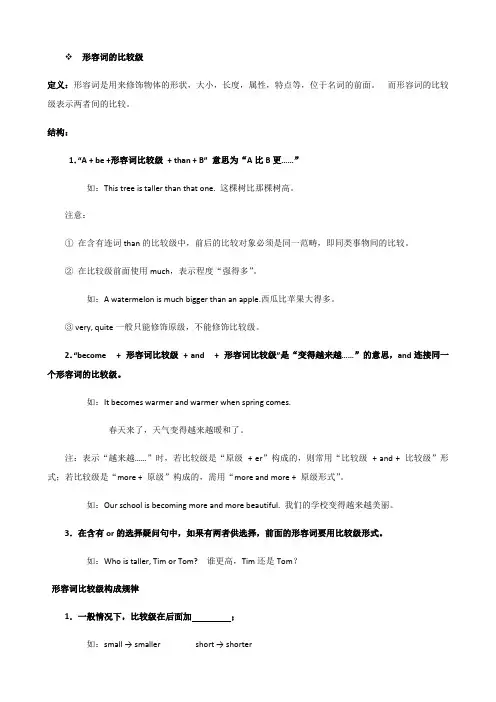
形容词的比较级定义:形容词是用来修饰物体的形状,大小,长度,属性,特点等,位于名词的前面。
而形容词的比较级表示两者间的比较。
结构:1.“A + be +形容词比较级+ than + B” 意思为“A比B更……”如:This tree is taller than that one. 这棵树比那棵树高。
注意:①在含有连词than的比较级中,前后的比较对象必须是同一范畴,即同类事物间的比较。
②在比较级前面使用much,表示程度“强得多”。
如:A watermelon is much bigger than an apple.西瓜比苹果大得多。
③ very, quite一般只能修饰原级,不能修饰比较级。
2.“become + 形容词比较级+ and + 形容词比较级”是“变得越来越……”的意思,and连接同一个形容词的比较级。
如:It becomes warmer and warmer when spring comes.春天来了,天气变得越来越暖和了。
注:表示“越来越……”时,若比较级是“原级+ er”构成的,则常用“比较级+ and + 比较级”形式;若比较级是“more + 原级”构成的,需用“more and more + 原级形式”。
如:Our school is becoming more and more beautiful. 我们的学校变得越来越美丽。
3.在含有or的选择疑问句中,如果有两者供选择,前面的形容词要用比较级形式。
如:Who is taller, Tim or Tom? 谁更高,Tim还是Tom?形容词比较级构成规律1.一般情况下,比较级在后面加;如:small → smaller short → shorter2.在重读闭音节(即:辅音+元音+辅音)中,先双写末尾的辅音字母,比较级加-er,如:big →bigger hot →hotter3.以不发音e结尾的单音节词,比较在原级后加;如:large →larger nice →nicer4.以“辅音字母+y”结尾的双音节词,,比较级加;如:easy →easier heavy →heavier5.多数多音节词,比较级在前面加;如:beautiful → more beautiful different → more different6.有少数形容词的比较级是不规则的,必须熟记。
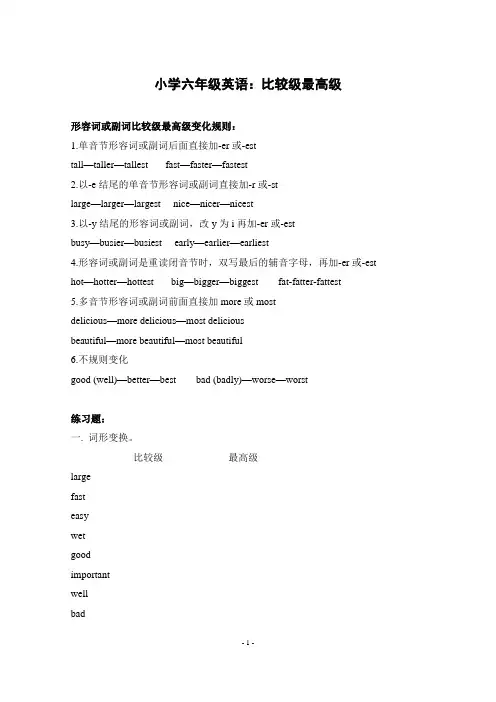
小学六年级英语:比较级最高级形容词或副词比较级最高级变化规则:1.单音节形容词或副词后面直接加-er或-esttall—taller—tallest fast—faster—fastest2.以-e结尾的单音节形容词或副词直接加-r或-st large—larger—largest nice—nicer—nicest3.以-y结尾的形容词或副词,改y为i再加-er或-est busy—busier—busiest early—earlier—earliest4.形容词或副词是重读闭音节时,双写最后的辅音字母,再加-er或-est hot—hotter—hottest big—bigger—biggest fat-fatter-fattest5.多音节形容词或副词前面直接加more或mostdelicious—more delicious—most deliciousbeautiful—more beautiful—most beautiful6.不规则变化good (well)—better—best bad (badly)—worse—worst练习题:一. 词形变换。
比较级最高级large _________________ ___________________fast _________________ ___________________easy _________________ ___________________wet _________________ ___________________good _________________ ___________________important _________________ ___________________well __________________ ___________________bad _________________ ___________________many _________________ ___________________little _________________ ___________________far _________________ ___________________strong _________________ ___________________patient _________________ ___________________safe _________________ ___________________expensive _________________ ___________________二. 选择填空。
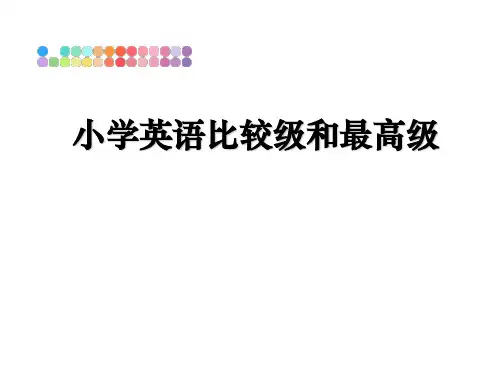
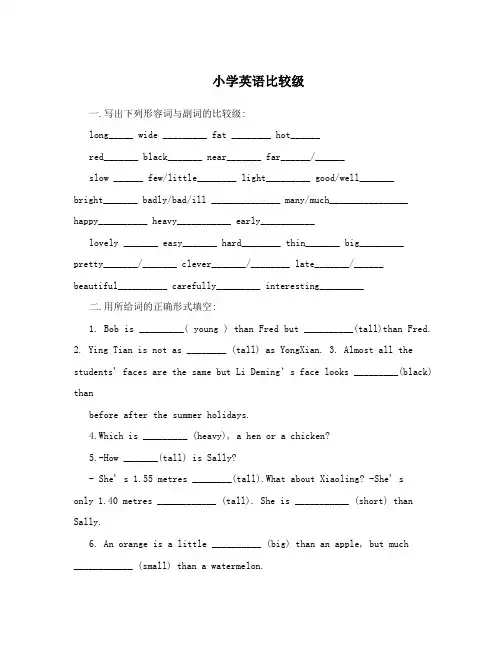
小学英语比较级一.写出下列形容词与副词的比较级:long_____ wide _________ fat ________ hot______red_______ black_______ near_______ far______/______slow ______ few/little________ light_________ good/well_______bright_______ badly/bad/ill ______________ many/much________________ happy__________ heavy___________ early___________lovely _______ easy_______ hard________ thin_______ big_________pretty_______/_______ clever_______/________ late_______/______beautiful__________ carefully_________ interesting_________二.用所给词的正确形式填空:1. Bob is _________( young ) than Fred but __________(tall)than Fred.2. Ying Tian is not as ________ (tall) as YongXian.3. Almost all the students' faces are the same but Li Deming’s face looks _________(black) thanbefore after the summer holidays.4.Which is _________ (heavy), a hen or a chicken?5.-How _______(tall) is Sally?- She' s 1.55 metres ________(tall).What about Xiaoling? -She' sonly 1.40 metres ____________ (tall). She is ___________ (short) than Sally.6. An orange is a little __________ (big) than an apple, but much____________ (small) than a watermelon.7. Sue is __________ (beautiful) than her sister.8. My room is not as ______ (big) as my brother' s.9.-- Annie plays the piano very _______________ (well).-- Sue plays it _________ (well) than Annie. And Sally plays it___________(well) too. 10. My brother is two years______________(old)than me.11. Tom is as____________(fat) as Jim.12. Is your sister ______________(young) than you? Yes,she is. 13. Who is_______________(thin),you or Helen? Helen is. 14. Whose pencil-box is ______________(big),yours or hers? Hers is. 15. Mary’s hair is as______________(long) as Lucy’s.16.Ben__________ (jump) ____________ (high) than some of the boys in his class. 17.________ _________Nancy sing _______________(well) than Helen? Yes, she ___________.18.Fangfangis not as _______(tall) as the other girls. 19.My eyesare ______________(big) than ____________ (she). 20.Whichis_______________(heavy),the elephant or the pig? 21.Whogets up_____________(early),Tim or Tom?22._________the girls getup___________(early) than the boys?No,they__________. 23. Jim runs _____________(slow). But Ben runs_________(slow). 24.The child doesn’t__________(write) as ________(fast) as the students. 三.翻译句子:1、谁比Jim年纪大,是我。
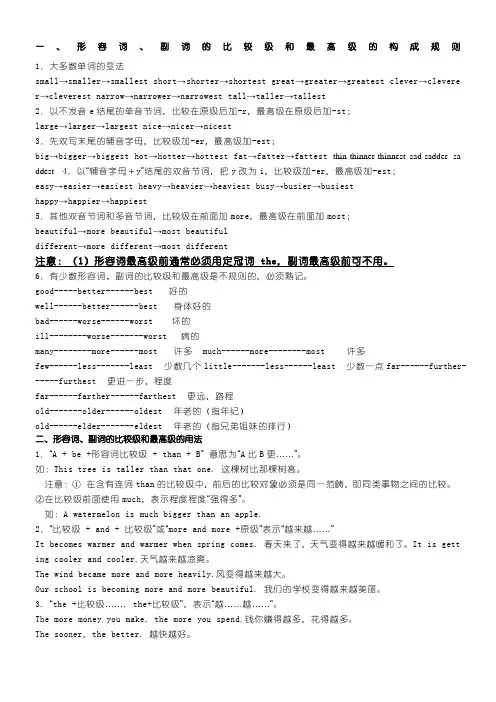
一、形容词、副词的比较级和最高级的构成规则1.大多数单词的变法small→smaller→smallest short→shorter→shortest great→greater→greatest clever→clevere r→cleverest narrow→narrower→narrowest tall→taller→tallest2.以不发音e结尾的单音节词,比较在原级后加-r,最高级在原级后加-st;large→larger→largest nice→nicer→nicest3.先双写末尾的辅音字母,比较级加-er,最高级加-est;big→bigger→biggest hot→hotter→hottest fat→fatter→fattest thin-thinner-thinnest sad-sadder--sa ddest 4.以“辅音字母+y”结尾的双音节词,把y改为i,比较级加-er,最高级加-est;easy→easier→easiest heavy→heavier→heaviest busy→busier→busiesthappy→happier→happiest5.其他双音节词和多音节词,比较级在前面加more,最高级在前面加most;beautiful→more beautiful→most beautifuldifferent→more different→most different注意:(1)形容词最高级前通常必须用定冠词 the,副词最高级前可不用。
6.有少数形容词、副词的比较级和最高级是不规则的,必须熟记。
good-----better------best好的well------better------best身体好的bad------worse------worst坏的ill--------worse-------worst病的many--------more------most许多 much------more--------most许多few------less-------least少数几个little-------less------least少数一点far------further------furthest更进一步,程度far------farther------farthest更远,路程old-------older------oldest年老的(指年纪)old------elder-------eldest年老的(指兄弟姐妹的排行)二、形容词、副词的比较级和最高级的用法1.“A + be +形容词比较级 + than + B”意思为“A比B更……”。